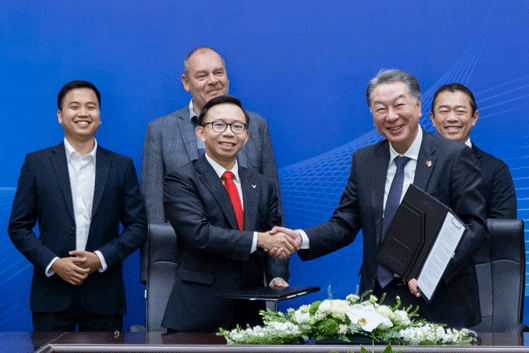
The F1 generation of VinGroup billionaire Pham Nhat Vuong – Mr. Pham Nhat Quan Anh – recently made a big splash at a VinFast event. This is also the first time one of Vuong’s three children has appeared in the media and signed with a Japanese partner.
In a rare appearance in 2019, he shared his experience of raising children in an interview with Tuoi Tre newspaper, where he was brought by Vuong for the interview. Quan Anh’s recent event shows the gradual transition plan at VinGroup, continuing the wave of intergenerational transition that is currently buzzing in Vietnam.
By the end of 2020, Le Viet Hai – Chairman of Hoa Binh Construction Group (HBC) – officially handed over the position of CEO to his third son, Le Viet Hieu. With Hieu’s age at the time still not yet 30, this event at HBC generated mixed opinions. Due to subsequent top-level incidents, Hieu has now left his CEO position and holds the position of Deputy CEO at HBC.
REE Group also had an emotional intergenerational transfer ceremony in 2020, along with other family dynasties such as Indo Trans-Pacific Group (IPPG) – the unit that owns foreign luxury fashion brands – now with each member of the Johnathan Hanh Nguyen family managing and operating a branch or a specific area; and T&T Group of former football chairman Hien has gradually involved the F1 generation in the “battle”…
In fact, in Vietnam, many Vietnamese family businesses have early leadership transitions from fathers and mothers (F0 generation) to sons and even grandchildren (F2 generation). The development of F1 and F2 in bringing family companies forward was considered timely, especially after Covid-19 with its series of changes and digital revolution.
The latest survey on 2023 family businesses by PwC (conducted with 2,043 business owners in 82 regions, including 36 family businesses in Vietnam) also shows that the transition is well-adjusted, as Vietnam’s family businesses reported good business growth in 2022. Specifically, more than 53% of businesses reported an increase in revenue, while 36% reported double-digit growth.
According to PwC, the F2 and F3 generations have the advantage of receiving proper education and being highly proficient in their field, as well as being quick to adapt to new things, proactive in market connections, and decisive in action… and they also receive great support from their parents.
Especially in the global trend of sustainable development and responsible business practices, the F2 generation leaders are more proactive in implementing ESG criteria. PwC’s NextGen survey indicated that 68% of NextGen Vietnamese participants believed that they have a responsibility to combat climate change, and 45% saw an opportunity for private businesses to lead in sustainable activities. Additionally, 77% wished to enhance sustainable investments in the future, reflecting strong ESG ambitions.
“The NextGen is considered to be a core driving force behind the development of private enterprises, and they play a significant role in building the ESG story,”
stated Johnathan Ooi, Leader of Private Business and Family Services, PwC Vietnam.
Alongside success stories, there are still many challenges in intergenerational transitions in Vietnamese companies. It is necessary, but not a few cases of businesses having to reluctantly “sell out” to partners because their children do not want to continue the legacy, such as the story of Tho Phat Banh Bao founder (selling over 70% of capital to KIDO Group).
Furthermore, issues such as differing views, hasty decisions without a clear roadmap, or discrimination can hinder the transition process and even lead to disputes and confusion in many Vietnamese companies.
According to Deloitte experts, there are two key areas to focus on for successful transitions:
First,
there is a need to professionalize existing family relationships. Successful family businesses around the world often plan early for the transition, finishing the plan before implementing it. However, when Deloitte interviewed family businesses in Vietnam, they mentioned considering the transition by sending their children abroad for education, assigning specific tasks to their children… but they have not made a specific plan for who will take on which positions in the company, what kind of training and education they should receive from a young age.
Second,
family businesses need to have a better understanding of gender equality and objectively evaluate their children’s potential, rather than giving more rights and priority in succession to sons over daughters.
“Observing transition processes, I see the second generation is successful, in which the proportion of women plays a significant role. In my opinion, sons and daughters need equal opportunities in intergenerational transition and asset succession,”
said a Deloitte representative.
In general, transferring power to the F1 generation is essential in the current context, especially as Vietnam faces great opportunities in technology and semiconductors. Therefore, many organizations need to learn from the lessons of intergenerational transitions from those who came before them, or from neighboring countries. The experts also emphasize that for families with many successful F1 members, there needs to be transparency, cleverness, fairness, and clear delegation of power from the beginning to avoid internal conflicts, as internal conflicts can potentially destroy family businesses.















